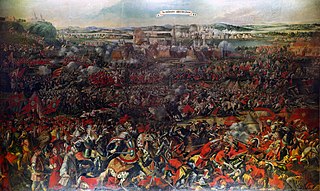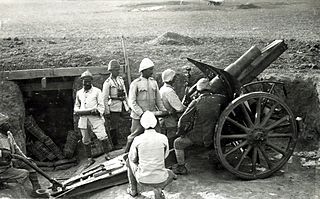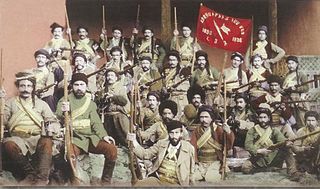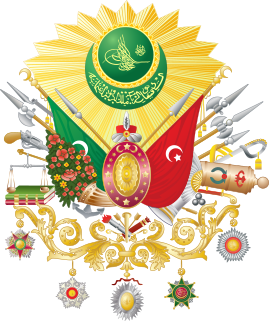
The Balkan Wars consisted of two conflicts that took place in the Balkan Peninsula in 1912 and 1913. Four Balkan states defeated the Ottoman Empire in the First Balkan War. In the Second Balkan War, Bulgaria fought against all four original combatants of the first war. It also faced an attack from Romania from the north. The Ottoman Empire lost the bulk of its territory in Europe. Although not involved as a combatant, Austria-Hungary became relatively weaker as a much enlarged Serbia pushed for union of the South Slavic peoples. The war set the stage for the Balkan crisis of 1914 and thus served as a "prelude to the First World War".

The Central Powers, also known as the Central Empires, was one of the two main coalitions that fought World War I (1914–18). It consisted of Germany, Austria-Hungary, the Ottoman Empire and Bulgaria; hence it is also known as the Quadruple Alliance. Colonies of these countries also fought on the Central Powers' side such as German New Guinea and German East Africa, until almost all of their colonies were occupied by the Allies.

The Crimean War was a military conflict fought from October 1853 to February 1856 in which Russia lost to an alliance of France, the Ottoman Empire, the United Kingdom and Sardinia. The immediate cause of the war involved the rights of Christian minorities in the Holy Land, which was part of the Ottoman Empire. The French promoted the rights of Roman Catholics, and Russia promoted those of the Eastern Orthodox Church. Longer-term causes involved the decline of the Ottoman Empire, the expansion of the Russian Empire in the preceding Russo-Turkish Wars, and the British and French preference to preserve the Ottoman Empire to maintain the balance of power in the Concert of Europe. It has widely been noted that the causes, in one case involving an argument over a key, had never revealed a "greater confusion of purpose" but led to a war that stood out for its "notoriously incompetent international butchery".

The Battle of Vienna took place at Kahlenberg Mountain near Vienna on 12 September 1683 after the imperial city had been besieged by the Ottoman Empire for two months. The battle was fought by the Holy Roman Empire led by the Habsburg Monarchy and the Polish–Lithuanian Commonwealth, both under the command of King John III Sobieski, against the Ottomans and their vassal and tributary states. The battle marked the first time the Commonwealth and the Holy Roman Empire had cooperated militarily against the Ottomans, and it is often seen as a turning point in history, after which "the Ottoman Turks ceased to be a menace to the Christian world". In the ensuing war that lasted until 1699, the Ottomans lost almost all of Hungary to the Holy Roman Emperor Leopold I.

The Ottoman wars in Europe were a series of military conflicts between the Ottoman Empire and various European states dating from the Late Middle Ages up through the early 20th century. The earliest conflicts began during the Byzantine–Ottoman wars, waged in Anatolia in the late 13th century before entering Europe in the mid 14th century with the Bulgarian–Ottoman wars. In the mid 15th century, the Serbian–Ottoman wars and the Albanian-Turkish wars were waged by Serbia and Albania respectively against the Ottoman Turks. Much of this period was characterized by Ottoman expansion into the Balkans. The Ottoman Empire made further inroads into Central Europe in the 15th and 16th centuries, culminating in the peak of Ottoman territorial claims in Europe.

The Sinai and Palestine campaign of the Middle Eastern theatre of World War I was fought by the Arab Revolt and the British Empire, against the Ottoman Empire and its Imperial German allies. It started with an Ottoman attempt at raiding the Suez Canal in 1915, and ended with the Armistice of Mudros in 1918, leading to the cession of Ottoman Syria.

The Great Turkish War or the Wars of the Holy League was a series of conflicts between the Ottoman Empire and the Holy League consisting of the Holy Roman Empire, Poland-Lithuania, Venice, Russia, and Habsburg Hungary. Intensive fighting began in 1683 and ended with the signing of the Treaty of Karlowitz in 1699. The war was a defeat for the Ottoman Empire, which for the first time lost large amounts of territory. It lost lands in Hungary and the Polish–Lithuanian Commonwealth, as well as part of the western Balkans. The war was also significant in that it marked the first time Russia was involved in a western European alliance.

The Middle Eastern theatre of World War I saw action between 29 October 1914 and 30 October 1918. The combatants were, on one side, the Ottoman Empire, with some assistance from the other Central Powers; and on the other side, the British, the Russians and the French from among the Allied Powers. There were five main campaigns: the Sinai and Palestine Campaign, the Mesopotamian Campaign, the Caucasus Campaign, the Persian Campaign, and the Gallipoli Campaign. There were also several minor campaigns: Arab Campaign, and South Arabia Campaign.

The Egyptian Expeditionary Force (EEF) was a British Empire military formation, formed on 10 March 1916 under the command of General Archibald Murray from the Mediterranean Expeditionary Force and the Force in Egypt (1914–15), at the beginning of the Sinai and Palestine Campaign of the First World War.

Mehmet Kâzım Orbay was a Turkish general and senator. He served as the third Chief of the General Staff of the Turkish Armed Forces.
The Battle of Sharqat was fought between the British and the Ottoman Empire in the Mesopotamian Campaign in World War I, which became the last conflict between the belligerents before of the signing of the Armistice of Mudros.

Fedayi, also known as the Armenian irregular units or Armenian militia, were Armenian civilians who voluntarily left their families to form self-defense units and irregular armed bands in reaction to the mass murder of Armenians and the pillage of Armenian villages by criminals, Kurdish gangs and Turkish forces, and Hamidian guards during the reign of Abdul Hamid II in late 19th and early 20th centuries, known as the Hamidian massacres. Their ultimate goal was always to gain Armenian autonomy (Armenakans) or independence depending on their ideology and the degree of oppression visited on Armenians.

The Battle of Sculeni was fought on 29 June 1821 in Sculeni, Moldavia between the Ottoman forces of Sultan Mahmud II and Greek Filiki Eteria forces led by Prince George Catakouzenos. The battle came about as the result of Ottoman reprisals for Alexander Ypsilantis' expedition in the two Danubian Principalities, and followed in the aftermath of the Battle of Dragashani. When the Ottomans crossed the Bahlui River in Iaşi on 25 June 1821, Lieutenant Catakouzenos and his forces, originally stationed on the Russian frontier, crossed the Prut River.

The Ottoman–Habsburg wars were fought from the 16th through the 18th centuries between the Ottoman Empire and the Habsburg Monarchy, which was at times supported by the Holy Roman Empire, Kingdom of Hungary, Polish–Lithuanian Commonwealth, and Habsburg Spain. The wars were dominated by land campaigns in Hungary, including Transylvania and Vojvodina, Croatia and central Serbia.
The Battle of Gorjani or Battle of Đakovo was a battle fought on 9 October 1537 at Gorjani, a place in present-day Slavonia, between the towns of Đakovo and Valpovo, as part of the Little War in Hungary as well as the Hundred Years' Croatian–Ottoman War.
Özdemiroğlu Osman Pasha was an Ottoman statesman and military commander who also held the office of grand vizier for one year.

Kuva-yi Milliye refers to the irregular Turkish militia forces in the early period of the Turkish War of Independence. These irregular forces emerged after the occupation of the parts of Turkey by the Allied forces in accordance with the Armistice of Mudros. Later, Kuva-yi Milliye was integrated to the regular army of the Grand National Assembly. Some historians call this period (1918–20) of the Turkish War of Independence the "Kuva-yi Milliye phase".
Ivaz Mehmed Pasha, also known as Hacı Ivaz Mehmed Pasha or Hacı Ivazzade Mehmed Pasha, was an 18th-century Ottoman grand vizier and provincial governor.

The Ottoman Empire came into World War I as one of the Central Powers. The Ottoman Empire entered the war by carrying out a surprise attack on Russia's Black Sea coast on 29 October 1914, with Russia responding by declaring war on 5 November 1914. Ottoman forces fought the Entente in the Balkans and the Middle Eastern theatre of World War I. The Ottoman Empire's defeat in the war in 1918 was crucial in the eventual dissolution of the empire in 1922.